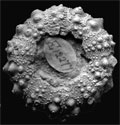The Echinoid Directory
Contributed by Andrew Smith, January 2017
Wrightechinus Smith, 2016, p. 93
| Diagnostic Features |
|
|---|---|
| Distribution | Middle Jurassic (Aalenian-Bajocian) of England and France. |
| Type | Acrosalenia lycetti Wright, 1851, by original designation. |
| Species Included | No other species are included. |
| Classification and/or Status | Euechinoidea; Carinacea; Calycina; Stem group Salenioida? |
| Remarks | Wrightechinus resembles acrosaleniids in having interambulacral tubercles which are perforated, strongly crenulated and surrounded by scrobicular tubercles, and which are much larger than the corresponding ambulacral tubercles. It also has trigeminate plating with plate-compounding in acrosaleniid style, short phyllodes and a large apical disc with periproctal plates indenting into the ring of ocular and genital plates. However, like phymosomatoids its apical disc is monocyclic, whereas all other acrosaleniids have a hemicyclic disc, with the anterior ocular plate exsert. It therefore holds a very interesting phylogenetic position, as it appears to occupy an intermediate position between the Salenioida and the Phymosomatoida. For the moment, it is included as the most primitive member of the stem group Salenioida. Smith, A. B. 2016. British Jurassic regular echinoids. Part 2 Carinacea. Monographs of the Palaeontographical Society (no. 646), pp. 69-176, pls 42-82. |






